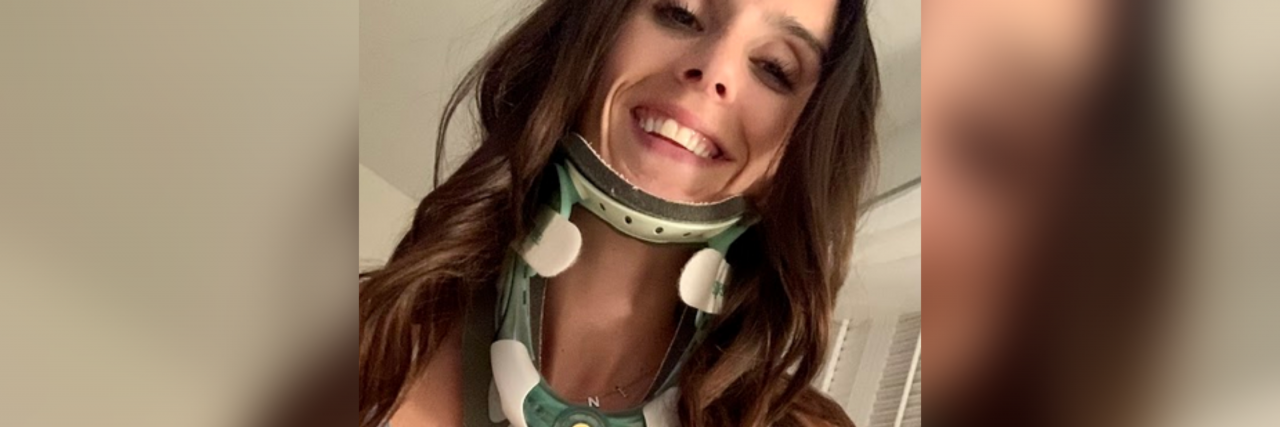I could write about the trenches of disability and chronic illness. Needles in my spine. Brain surgery. Passing out in front of my friends at school. The constant nausea, missing out on events, depression and anxiety. Chronic illness and disability are teeming with valleys and trenches; holes so deep sometimes you feel like you can’t pull yourself out. But what if you didn’t have to pull yourself out? What if there were others out there who have been in that same trench, fighting that same battle as you who are ready to help you through your hardest battles? What if all you had to do was look toward Instagram to make you feel a little less alone? Today, I want to write about one silver lining of living with a chronic illness or disability — the community.
• What is Ehlers-Danlos Syndrome?
• What Are Common Ehlers-Danlos Syndrome Symptoms?
I’ve been “manageably chronically ill” (I would call it) most of my life, but the past year has led me further from “chronically ill” toward identifying as “disabled” for the first time in my life. I started 2021 in the ICU with a massive CSF leak where there was virtually no spinal fluid left in my spine and ended 2021 with major brain and neck surgery to have my skull decompressed and fused to my spine to combat dangerous spinal cord and brainstem compression from severe instability in my neck. 2021 was understandably one of the lowest, longest years of my life. I had to quit my job, enroll my daughter in full-time care, and spend most of my days unable to get out of bed, awaiting surgery as my last shot at getting some of my life back.
Upon hearing that I needed an Occipital-Cranial Fusion and Chiari Decompression surgery in late 2021, I decided to jump into social media to find others who had had this procedure done, which turned out to be one of the best decisions I have ever made. I came to hear their stories, to get their tips, and to learn from their experiences. However, what I found was far more valuable than anything I set out for. I found myself instantly and overwhelmingly welcomed into the virtual chronically ill and disabled community. Instantly. And. Overwhelmingly.
Social media sometimes gets a bad reputation. We spend too much time on it. We miss out on real-life moments because our heads are stuck in our phones. It leads to unfair expectations as influencers carefully curate their lives to look picture perfect on the square grids where they can tell whatever story they choose. And before this year, I would have completely agreed with this assessment of the dangers of social media. However, after getting involved in the chronically ill and disabled community on social media, this assessment could not be further from the truth.
I was recently talking with one of my Instagram friends about my post-surgery recovery when I mentioned that I made it through an entire meal at the dinner table with my family, which I haven’t felt well enough to do in over a year. She celebrated this small victory with me as if I told her I climbed Mt Everest. It wasn’t until then that I stopped and realized how minor sitting through a meal really was. Most people do that three times a day and don’t even think about it. Her celebrating this small win with me showed me just how important community is in the disability space.
No one understands our daily battles like we do. No one can empathize with the struggles like we can. No one can help pull us out of our trenches better than someone who spent time in that same trench themselves. And no one can celebrate these small, but actually huge victories for each other like we can. As one of my good friends from @TheUnheardOnes says, “your story is my story, and my story is your story.” This is the true beauty of social media–finding hundreds of people from around the world who share your illness, your pain, your journey, and therefore can share in your successes, your path forward, your healing.
I often think about if I could do my life over again without my health problems, would I? And I can honestly say that I don’t think I would. Without my disability, I wouldn’t be so passionate about inclusion and accommodations. Without my disability, I wouldn’t be as compassionate and understanding toward the visible or invisible load others might be carrying with them. Without my disability, I wouldn’t have been able to raise my young daughter to view others who may look different from her with so much respect and love. And without my disability, I wouldn’t have made some of the best friendships I have ever had, ones I am not sure I would trade my diagnosis for.
If you are disabled, or are a caregiver for someone who is disabled, or you’re feeling alone, or even if you just want to learn more about disability and inclusion, I encourage you to jump in and create or deepen your friendships with other disabled people, both virtually and in real life. Follow chronic illness or disability hashtags. Friend the people sharing their stories. Research the diseases they are raising awareness for. Take the steps they suggest toward making your own life more inclusive. I promise, it will change your life, just as it has changed mine. And if you ever need a friend who can empathize, cry with you, share in your small victories, or help you find your own online community, I’m always available to talk, @BracedAndFused.

